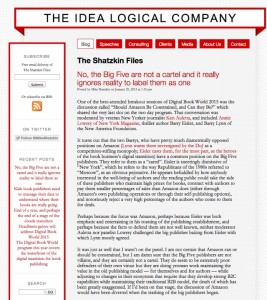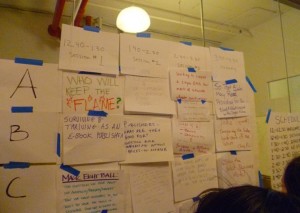And Yet…Looking at Publishing’s Big Five and the Book Business Today
This weekend I read an essential piece about the state of the book business today from industry analyst Mike Shatzkin. It’s titled “No, the Big Five are not a cartel and it really ignores reality to label them as one.” You may read it at the author’s blog via this link. (Disclosure: I’ve known Shatzkin since 1980.)
His piece, in part, pushes back on rhetoric from some people in the self-publishing community who cast publishing’s Big Five (that’s Penguin Random House, Hachette, Macmillan, Simon & Schuster, and HarperCollins) as a veritable OPEC of books. He doesn’t so much defend the Five as point out realities that apply in the business, actualities that are sometimes overlooked or skipped over by some of self-publishing’s most zealous celebrants. One critic, Barry Eisler, claimed during a panel at the recent Digital Book World conference that publishers don’t really compete against one another, and instead largely cooperate with each other to the detriment of authors. As Shatzkin shows, this isn’t really borne out by the facts:
“First of all, the Big Five have plenty of competition: from each other, as well as from smaller niche publishers who may but [sic] be ‘big’ but certainly aren’t ‘small’. (That is why the big ones so often buy the smaller ones — they add scale and simultaneously bring heterogeneous talent in-house). They are all quite aware of the authors housed elsewhere among them who might be wooable. In fact, since we have started doing our Logical Marketing work, we have done several jobs which were big author audits commissioned by publishers who wanted to steal the author, not by the one which presently has them signed. Eisler explicitly resisted accusing the publishers of ‘collusion’, but he does accuse them of ‘not competing’ with each other. That is an accusation that is simply not supported by the facts. Nobody who has spent any time talking to people who work in big houses could possibly get the impression that they don’t compete.”
My own outlook on the book business is derived from the fact that I’ve worked in many sectors of it—retail bookselling from 1978-85; small and big-house publishing from 1985 to 2009; and for the past six years, I’ve been working independently, often with self-published authors. I appreciate the new access writers have to publication, an emerging space that’s also enabled me to chart a new career path over the past six years. As an editor and consultant, I help writers pursue all their options, including self-publishing; as an author’s representative, I also look to license books to traditional publishers. I have criticisms of big and small houses, believing, for instance, that they should pay higher royalties than the 25% of net proceeds on ebooks that is common. And yet, I also appreciate what traditional publishers, big and small, are capable of doing for the titles they acquire and publish.
I don’t believe self-publishing solves all problems in the book business, and am uneasy with what I take to be a kind of evangelical fervor for self-publishing exhibited by some people. And yet, I definitely relish the variety in the business now, as barriers to publication have been lowered for many writers who wouldn’t earlier have found their way in to print. If you want an informed perspective on the business today, I recommend you read Shatzkin’s latest column, and keep up with what he posts on his blog. For starters, here’s a screenshot of the first four paragraphs of “No, the Big Five are not a cartel and it really ignores reality to label them as one.”





